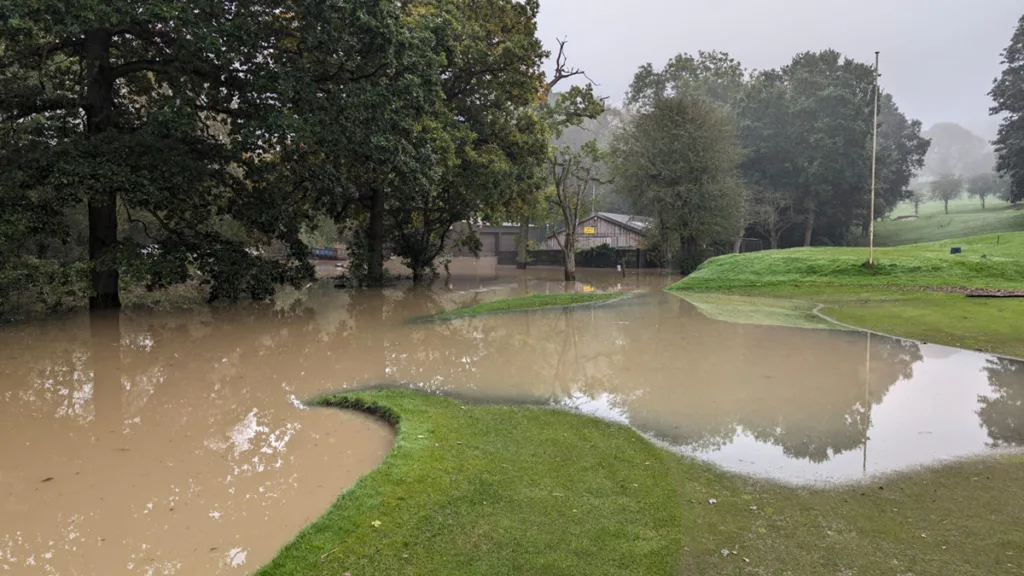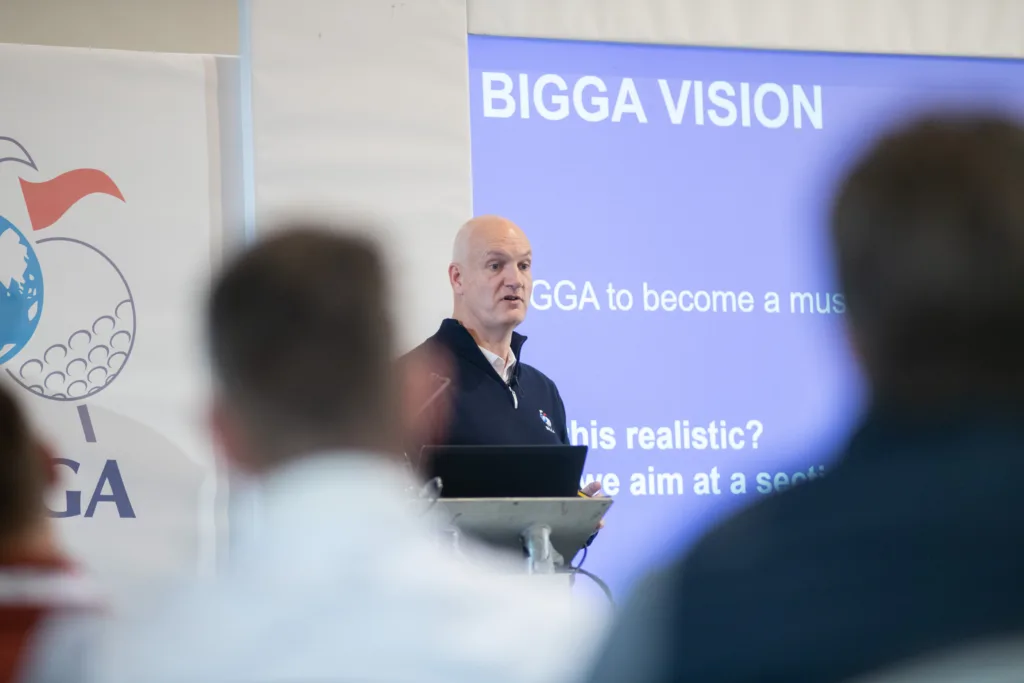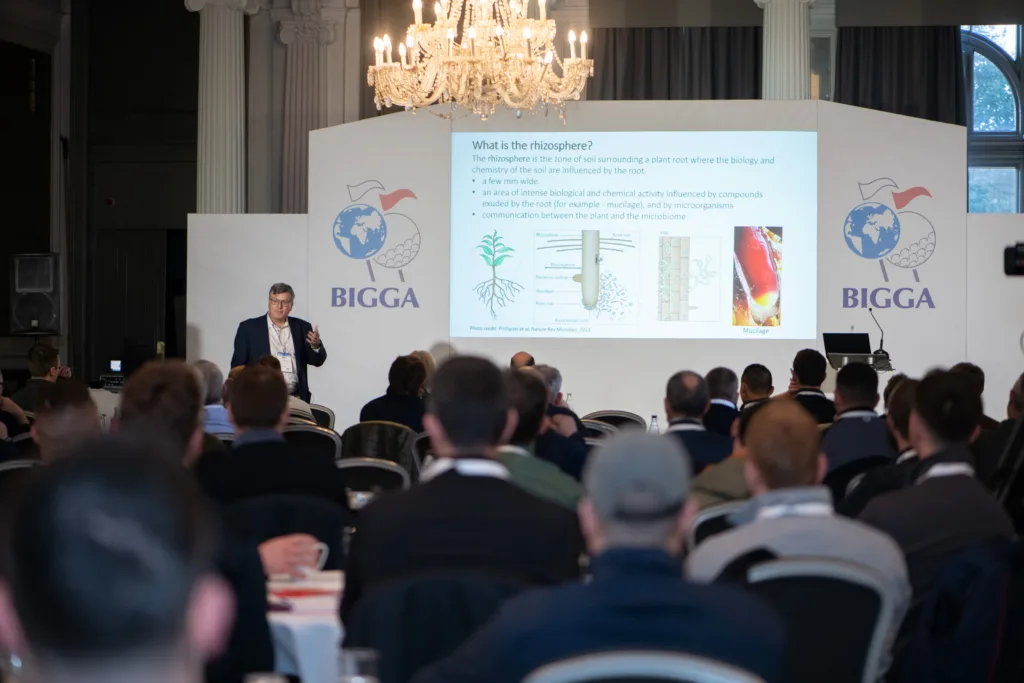Adapting to Pay Equity, Social Media, and Industry Shifts
As the greenkeeping and grounds sector undergoes transformative changes, we reached out to BIGGA to see how this association is strategically adapting to challenges in pay equity, embracing social media, and navigating industry shifts.
In the ever-evolving landscape of greenkeeping and grounds management, the industry is experiencing a paradigm shift fueled by technological advancements, changing workforce dynamics, and the omnipresence of social media.
As greenkeepers and groundspeople navigate through these transformative times, we feel it’s all the more imperative for associations to not only keep pace but also proactively adapt to theemerging trends that shape the profession.
We’ve sought out the strategies employed by some of the best-known grounds and greenkeeping associations to stay relevant and responsive as the industry continues to evolve. We contacted the and the British and InternationalGolf Greenkeepers Association (BIGGA) to learn more about how they’re navigating and adapting to the demands of social media, addressing staffing shortages, advocating for fair compensation within the industry, and more.
Q: What do you see as the most significant challenges currently facing the greenkeeping and grounds industry?
Two major shifts that we can mention are the impact of climate change and the availability of resources. The warming climate is creating more extreme weather events and these cause difficulties such as increased flooding, erosion and extreme drought.
We are already seeing golf courses that could be considered victims of climate change, such as Renishaw Park in South Yorkshire, which closed in part due to loss of revenue caused by flooding.

Warmer weather in winter means golfers expect to play all year round and whereas winter maintenance was commonplace as playing levels reduced, today’s greenkeepers must be able to produce playing surfaces all year round and be able to adjust their plans at short notice to overcome whatever nature throws at them.
With regards resources – whether it be the availability of aggregates, water, machinery, products or staff – greenkeepers are having to do more with less. Global supply chains remain affected by Brexit and the pandemic and costs have increased dramatically. Water sources are becoming more expensive or unavailable, sand for bunkers and topdressing isn’t always freely
available and changing legislation has limited the products that are available. The availability of staff and adequate remuneration is another challenge that BIGGA is addressing head-on.
Q: How has the closure of forums, like the recently closed Pitchcare forum, impacted the industry’s information-sharing landscape? Do you think there is still a need for forums?
The BIGGA website previously had an active forum, where members exchanged ideas and best practice, but the onset of social media removed much of the appetite for this. Online conversations now take place on social media and we’re keen to engage and promote these whenever possible. While digital platforms are hugely important, what remains key to the wider health of the industry is that organisations like BIGGA continue to provide in-person opportunities for turf professionals to meet and exchange ideas. Our programme of regular events helps facilitate this.
Q: In light of the increasing use of social media, how is your association leveraging online platforms to connect with members and share valuable information?
BIGGA is undertaking a digital transformation, albeit with an appreciation that many members still value our print offerings. In recent years the association has invested in a new smartphone app, an improved website and our social media offering is increasing daily.
The BIGGA website features thousands of digital resources for members to access at no additional cost, with many Continue to Learn education sessions recorded and made available for members to revisit.
We contact our members regularly via a fortnightly email newsletter, app updates, and a recently-launched WhatsApp channel. We have a growing YouTube channel and are exploring opportunities to reintroduce a podcast offering.
The key to successful communication is being everywhere your audience is, and that means our communications team is working harder than ever before. Supported by the wider BIGGA team, we are communicating with our members online, in print, over the phone, in person and countless other ways.
Q: How are you adapting to social media groups being formed that provide new spaces for groundstaff to post job listings for free, connect with other groundstaff, and share their experiences in different job roles?
BIGGA was created out of a desire for greenkeepers to build a community of likeminded professionals where ideas and knowledge could be shared. The rise of social media is the latest incarnation of that, so we believe well-intentioned groups are a force for good. Closed social media groups are useful for sharing ideas and tips on how to find new entrants to the industry, but BIGGA’s recruitment offering remains the most comprehensive approach to finding senior
and qualified staff.

Q: With the evolving demands in the industry, how is your association addressing concerns related to pay and compensation for greenkeepers and grounds professionals?
A look through the BIGGA archives tells you this is a longstanding concern among greenkeepers and while everyone would like to be paid more, the burden of proving your worth largely rests on the individual. That’s why BIGGA works so hard to provide our members with education opportunities that enable them to demonstrate their value and equip them with the tools to communicate their achievements and skills, which in turn helps when they go to the negotiating table.
But we appreciate that official guidance by leading industries bodies assists in these conversations and that is why BIGGA is one of the most vocal representatives on the Committee for Golf Club Salaries. That body produces recommended salaries for golf club staff.
We work to raise awareness of these guides among the club management structure, encouraging industry leaders to be aware of and adopt them, and there is evidence that these recommendations are increasingly playing a role as golf clubs set their teams’ salary levels.
Furthermore, BIGGA has also undertaken extensive research with regards salary and workforce matters and we use this data to advocate for better wages and benefits in the industry. BIGGA representatives sit on the All-Party Parliamentary Group for Golf, the Golf Forum and other influential bodies and the information we have gathered is vital as we lobby these platforms.
Q: Given the reported staffing shortages in the industry, how is your association working to help organizations attract and retain skilled professionals? Are there specific programs or strategies in place to address the recruitment challenges faced by the industry?
In early 2023, BIGGA recruited its first Workforce Project Manager, a permanent role that demonstrates our commitment to tackling these issues head-on. In her first year, Jenny Bledge has made great strides forwards in the introduction of the First Green initiative to the UK. First Green utilises STEM learning to showcase a career in greenkeeping to schoolchildren from through to secondary level. The easy-to-use resources enable every golf club in the country to open their doors to the community, raising awareness of the industry and attracting new talent.
Beyond First Green, Jenny is also working alongside other organisations to promote greenkeeping as a career choice for armed forces veterans and those seeking a career change.
There are countless ways to promote greenkeeping to the wider public and we’re working hard with our members to address this, helping to create a strong industry not just today but also for generations to come.

Q: How has your association adapted its training and education programs to align with the changing needs and advancements in the greenkeeping and grounds industry?
Continue to Learn, our flagship education programme, is truly world-renowned. Key to its success is the fact the programme is produced with input from our members, meaning greenkeepers shape the learning on offer to their peers.
Continue to Learn is the most public facing of our education offering but at every level of the association we produce learning opportunities for our members. Whether it be local turf clubs and course walks, our regional conferences or our Learning & Development Roadshows, we provide a wide variety of educational offerings for greenkeepers at every stage of their career.
BIGGA also administers the work of the Greenkeepers Training Committee (GTC), which sets the standards for formal qualifications and apprenticeships across the UK.
To support with any financial implications, BIGGA and our commercial supporters also provide several scholarship opportunities that can offset the cost of learning, meaning development and career progression is available to everyone, regardless of economic background.
Q: Are there new certifications or training modules introduced to enhance the skill set of industry professionals?
Working with the GTC and the Greenkeeping Trailblazer Group, BIGGA has recently supported an overhaul of the apprenticeship offering for trainee greenkeepers. This has included the introduction of a Level 5 qualification for course managers, reinforcing our belief that lifelong learning is key to building a successful career.
BIGGA and The GTC host a standardisation meeting each year at BTME, ensuring the UK’s training providers are aligned, and opportunities to improve training offerings is ongoing.
Q: How do you envision the future of the greenkeeping and grounds industry, and what role does your association play in shaping that future?
Tomorrow’s greenkeepers will need to be better trained than ever before and they’re going to have to achieve things with fewer resources. Excellent communication skills and the ability to adapt at a moment’s notice are going to be essential, but this pressure will mean you see more greenkeepers achieving greater positions in the wider golfing industry. Greenkeepers are going to be among the best trained members of staff within the golf club structure and they will play an increasing role in shaping the entire industry – Dan Lightfoot MG at The R&A being the most high profile example so far.
BIGGA will continue to provide opportunities such as the Future Turf Managers Initiative and we will grow and adapt to match the needs of our members. We will promote best practice and always present a professional image that is reflective of the changing greenkeeping profession.

Q: Are there emerging trends or innovations that your association is closely monitoring and addressing to keep members informed?
The greenkeeping industry is well placed to address the wants of Generation Z, who are looking for two key things in their careers – the use of technology and a flexible work/life balance. The first of these is already having a big impact on the industry, whether it be autonomous mowers, automated irrigation systems, the use of drones to monitor turf health, soil sensors or the plentiful other ways new technology is being used to create better surfaces.
We believe that tomorrow’s greenkeepers will be technologically astute, with a wide range of tools that enable the creation of playing surfaces in an efficient and sustainable manner, and that means greenkeeping is potentially well-placed to attract new talent.
The other matter is that of time. Greenkeepers start early in the morning and are often required to work at weekends. Courses must be ready for golfers to enjoy and so it remains a challenge as to how this can be fulfilled, while attracting staff who are looking for a more routine 9-5 existence. It may be improving
technology helps to facilitate this.
Q: How does your association gather feedback from members regarding needs, concerns, and suggestions? Have there been recent changes or adaptations based on member feedback?
The core BIGGA team is supported by a network of volunteers and regular dialogue with these, whether via our regional board structure or otherwise, provides us with a clear steer on the requirements of our members.
Our National Board comprises senior greenkeepers who volunteer their time freely to guide the association and so we believe we have a clear and close connection with the needs of our members. Our members lead us, ensuring we achieve our overarching strategy in line with their changing requirements.
Big thanks to BIGGA for contributing to this article. You can learn more about BIGGA’s work in the golf and greenkeeping industries by visiting bigga.org.uk.


